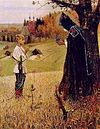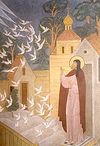

| Previous day | Next day |
| Old Style
September 25
|
Friday |
New Style
October 8
|
|
16th Week after Pentecost.
Tone 6.
Fast Day. |
Wine and oil allowed.
|
![]() St. Euphrosyne, nun, and her father St. Paphnutius, monk, of Alexandria (5th c.).
St. Euphrosyne, nun, and her father St. Paphnutius, monk, of Alexandria (5th c.). ![]() Repose of St. Sergius, abbot, of Radonezh (1392).
Repose of St. Sergius, abbot, of Radonezh (1392).
Monk-martyr Paphnutius and 546 companions, in Egypt (ca. 303). St. Euphrosyne, nun, of Suzdal (1250). Translation of the relics of St. Herman, archbishop of Kazan (1595). St. Dosithea the Recluse, of the Kiev Caves (1776).
New Hiero-confessor Nicholas Rozov, archpriest, of Yaroslavl (1941).
Commemoration of the earthquake in Constantinople in 447. St. Cadoc, abbot, of Llancarfan (577). St. Finbarr (Barry), bishop of Cork (ca. 633). St. Ceolfrith (Geoffrey), abbot, of Wearmouth-Jarrow Monastery (716). St. Arsenius the Great, catholicos of Georgia (887). Martyrs Paul and Tatta and their children Sabinian, Maximus, Rufus, and Eugene, of Damascus.
Repose of philosopher Alexei Stepanovich Khomiakov (1860).
Thoughts for Each Day of the Year
According to the Daily Church Readings from the Word of God
By St. Theophan the Recluse

Friday. [Eph. 1:7-17; Mark 8:1-10]
Having filled four thousand with seven loaves of bread, the Lord straightway entered into a ship, and came into the parts of Dalmanutha as if nothing particular was done. Such is the true doing of good—to do it continually, not paying attention to what has been done, and always forgetting what is past, to stretch towards what is ahead. This comes naturally for those who are filled with goodness. Just as a strong man lifts heavy weights without noticing while a weak man who has lifted up a small weight cannot seem to forget it, so one who is strong in goodness does every good without strain, whenever the occasion arises, while one who is poor in goodness cannot manage without straining. He remembers the good, and he keeps looking back and glancing at it. A good heart craves to do good, and is not satisfied until it has done good in abundance, as a man is not satisfied until he has eaten his fill. While hunger is felt, dinner is remembered, but when the hunger is satisfied, all is forgotten: so with a truly good person a good deed is remembered while it is not yet done; but once it is done, it is forgotten.
Saturday. [I Cor. 10:23-28; Matt. 24:34-44]
Watch therefore; for ye know not what hour your Lord doth come. To be vigilant does not mean to sit with your arms folded, but rather to keep in mind that the Lord will suddenly come, to behave and conduct your affairs so as to be ready to meet Him at any instant, not fearing reproach and condemnation. How is one to do this? Very simply. Walk in the commandments, not breaking a single one; and if it happens that you break one—immediately cleanse yourself through repentance and its proper fulfilment. Then everything in you will be clean. And do not leave sin on your soul for a minute; immediately repent, weep in your heart and run to your spiritual father to confess and receive absolution, and then again take on deeds according to God’s commandments. If you set out zealously to be proper in life—you will soon become proper; just don’t remain for long in a fall. Falls in such a case will become ever rarer, and eventually will completely cease, with the help of the all-healing grace of God. Then there will dwell in you the joyful assurance that you will not meet the Lord unprepared.















